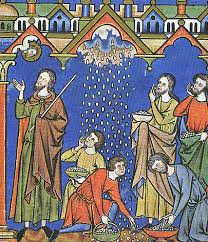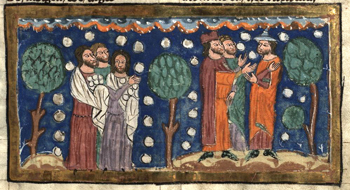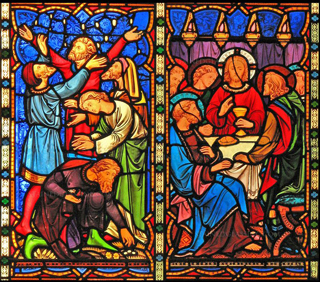For Sunday August 8, 2021
Lectionary Readings (Revised Common Lectionary, Year B)
1 Kings 19:4-8
Psalm 34:1-8
Ephesians 4:25-5:2
John 6:35, 41-51
When I was a little girl, my younger brother and I liked to organize “trips.” We weren’t allowed to wander much farther than the end of our suburban block, so our travel planning was more about provision than destination. Before we'd set off on a journey, we would raid the kitchen for snacks. Grapes, apples, graham crackers, popcorn. We’d fill our water bottles. And for our “main course,” we’d squish soft, white bread into little balls (sans crust), dip them in strawberry jam, and stick them into Ziploc bags. (Our main courses were sticky.) Then we’d take off on a well-provisioned adventure.
We learned this culinary aspect of travel planning from our parents. In the summers, Dad would rent a fifteen passenger van, and he and Mom would invite friends and extended family members to join us on road trips. We’d take off for a week or two, exploring the United States together. New York City, Niagara Falls, Washington D.C, and Disney World are some of the places I remember visiting.
What I remember more clearly than the destinations, though, is the food we ate along the way. Before each trip, my mother would hole up in her kitchen with a few of my aunts, and prepare a spectacular assortment of snacks and meals for the road. Fried plantains and banana chips; rice-flour-based “breads” like appams and idlis; dosas stuffed with spicy potatoes; crispy lentil patties called “vadas;” chicken biryani wrapped in single-serving aluminum foil “pockets;” and sweet cardamom cake for dessert.
These were the foods we carried, and they made up at least half the fun (and the mess) of each summer adventure. Sometimes we’d eat in the van, passing brown paper bags of banana chips and vadas back and forth between the rows of seats. Sometimes, my father would pull over to a rest stop, my mother would spread a bedsheet out on the grass, and we’d feast by the highway.
 |
On none of those trips did it occur to my parents to buy takeout. Preparing, serving, and carrying our own foods — foods rich in cultural associations, family memories, and cherished scents and flavors — was a precious and essential part of our vacations.
Of course, those journeys were leisurely ones, and the foods that accompanied them were consumed light-heartedly and with pleasure. But I remember other journeys, too, and the foods they required. I remember the night my grandfather died suddenly and without warning, necessitating my mother’s emergency flight back to India to attend his funeral. As Mom mourned and cried and packed, my aunts streamed into our house to stuff warm Tupperware dishes into her carry-on luggage. They wanted her to eat something, anything. They wanted her to feel nourished, even as she grieved.
I remember the treacherous drives my father would sometimes make for work during icy Boston winters, and the flasks of strong coffee my mother always brewed for him before he left home, to keep him alert behind the wheel.
And I remember the huge pots of stew my parents brought to my house when I was recovering from childbirth — sore, hormonal, tired, and overwhelmed by my colicky newborn. “To build your strength back up,” my mother said each time she handed me a steaming bowl and insisted that I empty it. “Motherhood is a long journey. You need to be strong.”
In this week’s Old Testament reading, the prophet Elijah finds himself on a journey of his own — an arduous journey filled with peril and terror. We find him in the wilderness at the end of his strength, literally asking God to kill him so that he won’t have to face the hardships of another day.
The backdrop to this story is Elijah’s dramatic and violent defeat of Baal’s prophets in 1st Kings 18. In a mountaintop scene worthy of a blockbuster action film, Elijah calls down fire from heaven, decimating his opponents and proving to everyone present that Yahweh is the true God.
 |
But when the showdown is over, Elijah is not elated; he’s frightened, bewildered, depressed, and suicidal. Perhaps — and here I’m conjecturing — he’s conflicted about the vast amounts of blood he has shed in the name of religion. Perhaps he's confused by his own exhaustion. Perhaps he fears that his own death is near. Which it might be: Queen Jezebel, incensed by Elijah’s success, has issued a death warrant, forcing Elijah to flee for his life. We find him after many hours of running, as he finally collapses under a solitary broom tree, prays for death, and falls asleep.
What follows is one of the most gentle and tender passages in the Old Testament. Elijah awakens to the touch of an angel, who says to him, “Get up and eat.” When Elijah looks around, he sees that the angel has prepared “a cake baked on hot stones, and a jar of water,” for him to eat and drink. Elijah, still sleepy and despondent, nibbles and sips. But not to the angel’s satisfaction. She rouses him again, this time with these words: “Get up and eat, otherwise the journey will be too much for you.”
At her second invitation, Elijah obeys in earnest, and his strength is renewed. The lectionary goes on to note that the prophet perseveres in his journey after he eats the angel’s cake. In fact, he’s able to endure for forty days and forty nights on the nourishment of that one meal.
Bread to carry. The angel feeds Elijah bread to carry. Bread for the road. Bread for hope. Bread for the long haul that is life. Or as writer Lauren Winner describes it, "the bread that sustains oppressed people on their journey through dangerous terrain."
There is much to love in this story. I love that the angel prepares Elijah’s meal right in front of him as Elijah snores away, only rousing the prophet when breakfast is ready. I love that the cake is warm and fragrant from the hot stones. I love that it's cake. More importantly, I love that the angel is persistent in her efforts to pull Elijah out of his depression — she wakes him up twice, and prods him until he eats the whole meal. I love that she touches him, communicating gentleness and empathy with her hands.
Finally, I love that the angel never minimizes or dismisses the difficulties of Elijah’s journey. She never says, “Buck up, Elijah; your situation isn’t so bad.” Or, “You’ve survived the worst of it, I promise; it’ll all be downhill from now on.” Or, “Once you eat what I’ve prepared for you, things will be smooth and easy.” Or, “What has happened to your faith? Your doubt is grieving God!”
 |
No. She says, “Eat.” “Eat because the journey is hard. Eat because you won’t ever make it on your own. Eat because God longs to nourish you with food that will save your life.” The angel doesn’t spiritualize Elijah’s exhaustion, or deny his difficult reality. She doesn’t offer him a shortcut; the journey is his to make, and it can’t be sidestepped. But, she says, he can choose how he makes the journey. He can decide what condition he’ll be in when he embarks. Famished or fed. Strengthened or weak. Accompanied or alone. He gets to choose.
And so do we. What provisions do you carry on your life journey? What do you depend on for nourishment when the going gets rough? Do you recognize the angels God sends your way, their arms full of journeying bread? When they invite you to eat, do you accept their invitation?
In this week’s Gospel reading, Jesus compares himself to manna, another ancient and powerful food source. Manna sustains the Israelites in their long wilderness, just as the angel’s cake sustains Elijah in his. And so Jesus desires to sustain us in ours, to be our journeying bread for every road trip, every perilous ride, every long haul, every rocky path. He desires to be our substance and our strength — not in some magical, cure-all way, but in ways that meet us in our real lives, our real challenges, our real fears and griefs and hopes. Because Jesus knows better than anyone that the journey is hard. He knows it’s too much for us to handle on our own. He knows we need bread that sustains. His bread. His flesh. “Given for the life of the world.” Get up and eat.
Debie Thomas: debie.thomas1@gmail.com
Image credits: (1) Ponder Anew and (2) Wikimedia.org; and (3) Stained Glass, Inc.





